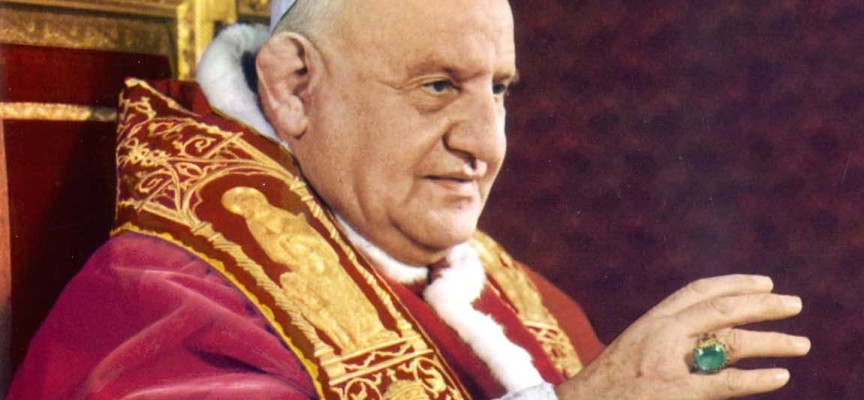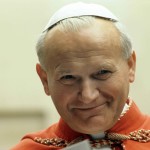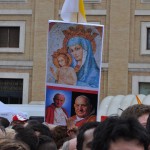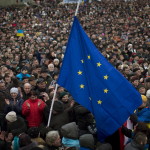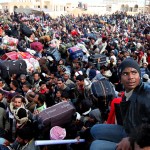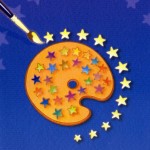“The nations, therefore, must work with each other for their mutual development and perfection. They can help themselves only in so far as they succeed in helping one another. That is why international understanding and co-operation are so necessary”. This is only a tiny splinter of an encyclical letter by Pope John XXIII, sometimes forgotten, Mater et Magistra.
When he signed it, Pope Roncalli was eighty years old. A human and spiritual pathway lived in the effort to promote the encounter of human beings, being aware that they belong to one single family, the family of the human race if I may say so. And we also have, by Roncalli as a young seminarian, some unpublished notes written at the dawn of the twentieth century, where, in the same years in which he reaffirmed his desire to become a saint, he looked into his own conscience about the opposition between old Europe and the new American civilization, which is for him the image of the youth of the world. Even as a young priest, when he visited some European countries as the secretary of the bishop of Bergamo, Mgr. Giacomo Maria Radini Tedeschi, it is clear how well he understands that his worldview and his prayers must get well beyond the Alps and overseas.
During his journeys, he matured a strong awareness. He wrote, for example, after returning from a journey: “The experience we lived in this journey has also increasingly convinced us of the need to better coordinate the beautiful energy that has been awaken among Catholics in Europe.” And not only this. Soon he was sent right to the end of the Western world. On January 5, 1935, the Apostolic Delegate in Turkey and Greece, Mgr. Angelo Roncalli, got off the train at the railway station of Sirkeci, dusty terminus of Europe.
In the neutral Turkey the fury of war can only seem distant. Even here Roncalli perceived “the weeping of nations” coming “from every corner of Europe and also from outside.” He works very hard to dry these tears, to treat these wounds. “In a Europe which was almost totally silent, Your Holiness has protested against the inhumanity of anti-Semitism”; this is how the Jews, “the elder brothers”, expressed their gratitude to him. As nuncio in Paris, he attended the Peace Conference and discussed some European issues with the brother of another future pope, Lodovico Montini, More than foreign policy – or better, decolonization and European integration – as a bishop of the Catholic Church he fully lived the universal dimension of the Church. And this is what he would reaffirm, after being elected pope, through the Second Vatican Council. Roncalli was the ‘inventor’ as it were, of Ostpolitik, i.e. the opening to Eastern Europe, which was to lead, even after the Helsinki Conference, to greater freedom in terms of religious profession. And is it not true that this opening has paved the way, in the long term, to the possibility for these countries, after they got rid of their totalitarian regimes, to belong to the Europe of democracy? Didn’t he anticipate the idea of Europe breathing with two lungs, the East and the West, in opposition to persisting forms of particularism and selfishness? And what about his solemn assertion, specifically during his pontificate, about “such a common European good” that “exists as One and universal” and “by its very definition cannot favour any given nation at the expense of another one”.
For sure, even if we analysed all the texts of his pontificate, we would hardly find any detailed pronouncement on the project of European unity. We would rather find the themes of collaboration among States and peoples, unity among Christians, the need for inter-religious dialogue, and solidarity, all the way through his “opera omnia”.
Quando la firma, papa Roncalli ha alle sue spalle ottant’anni di vita. Una parabola umana e spirituale vissuta nell’impegno a favorire l’incontro fra gli uomini, nella consapevolezza della loro appartenenza a una sola famiglia, quella del genere umano, se così si può dire. Ci sono ancora, di lui, del giovane chierico Roncalli appunti inediti redatti all’alba del Novecento, dove, negli stessi anni in cui ribadisce la sua volontà di farsi santo, s’interroga sulla contrapposizione tra la vecchia Europa e la civiltà nuova dell’America, che per lui diventa l’immagine della giovinezza del mondo. Anche da giovane prete, quando visita qualche Paese europeo accanto al vescovo di Bergamo di cui è segretario, monsignor Giacomo Maria Radini Tedeschi, dimostra di ben comprendere che il suo sguardo sul mondo e la sua preghiera devono andare oltralpe e oltreoceano.
Viaggiando si fa però forte in lui una consapevolezza. Scrive ad esempio al ritorno da un viaggio: “L’esperienza che questo viaggio ha accresciuto in noi ci convince anche sempre più della necessità di meglio coordinare le belle energie che ormai si destano fra i cattolici dell’Europa”. Non solo. Ben presto gli toccherà arrivare proprio al terminale dell’Occidente. È il 5 gennaio 1935 quando il delegato apostolico in Turchia e Grecia, monsignor Angelo Roncalli, scende alla stazione di Sirkeci, polveroso capolinea d’Europa.
Nella Turchia neutrale la furia degli eventi bellici può solo sembrare lontana. Anche qui Roncalli avverte “il pianto delle nazioni” che gli arriva “da tutti i punti di Europa e anche da fuori”. Ma lavora molto per asciugare queste lacrime, per medicare queste ferite. “In un’Europa quasi tutta silenziosa, Vostra Santità ha protestato contro l’inumanità dell’antisemismo”: così lo ringrazieranno gli ebrei, “i fratelli maggiori”. Come nunzio a Parigi, assiste ai lavori della Conferenza di pace e ragiona di Europa con il fratello di un altro futuro papa, Lodovico Montini. Più che di politica estera – e si legga pure di decolonizzazione e d’integrazione europea – da vescovo della Chiesa cattolica vive pienamente la dimensione universale della Chiesa. È quello che riaffermerà, eletto papa, attraverso il Concilio Ecumenico Vaticano II. Roncalli è stato l’inventore per così dire dell’ostpolitik, dell’apertura all’Est dell’Europa che doveva portare, anche dopo la Conferenza di Helsinky, a una maggior libertà di professione religiosa. Quest’apertura non ha forse favorito, a distanza, la possibilità per questi Paesi, svincolati dal gioco di regimi totalitari, di appartenere all’Europa della democrazia? Non ha forse anticipato l’idea dell’Europa che respira con due polmoni, l’Oriente e l’Occidente, contro i particolarismi e gli egoismi che persistono? E che dire della solenne affermazione, proprio durante il pontificato circa “siffatto bene comune europeo” che “esiste Uno e universale” e “per sua stessa definizione non potrebbe favorire una nazione a detrimento di un ‘altra”?
Certo, anche scandagliando i testi del pontificato difficilmente troveremmo un pronunciamento dettagliato sul progetto di unità europea, ma i temi della collaborazione fra Stati e popoli, dell’unità fra i cristiani, del bisogno di dialogo interreligioso, della solidarietà, attraversano la sua “opera omnia”.
Marco Roncalli
giornalista, autore di “Papa Giovanni il Santo” tradotto in sei lingue
Latest posts by Marco Roncalli (see all)
- John XXIII – The inventor of Ostpolitik - 26 aprile 2014

